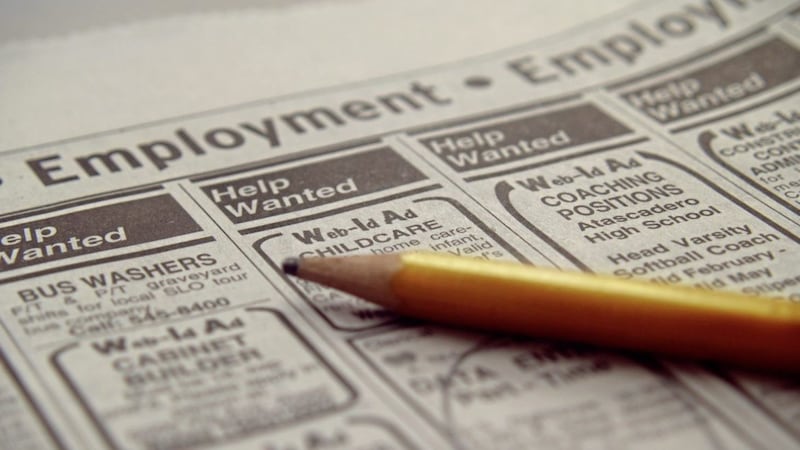UNEMPLOYMENT in the north fell by another 500 in September to 29,200 - the 19th consecutive monthly drop - according to the Northern Ireland Statistics & Research Agency.
In the June to August the jobless rate fell by 0.5 per cent on the previous quarter to 4.7 per cent - its lowest since the end of 2008.
While that is still slightly above the UK average of 4.3 per cent, it's below that of the European Union (7.7 per cent) and Republic of Ireland (6.4 per cent).
But there was a 0.3 per cent decrease in the number of people in work (68.4 per cent) over the quarter. The employment rate is also down 1.6 per cent over the year.
The economic inactivity rate (28.1 per cent) increased again in Northern Ireland over the quarter and is up 2.3 per cent over the year.
The figures show that while the roll-out of Universal Credit began last month (replacing out-of-work benefits for new claimants), it was too early to indicate if it has had a direct impact on claimant count figures.
There were 72 reported redundancies in September, and over the last year there has been a whopping 45 per cent decrease in the number of redundancies: from 3,493 to 1,932.
In the UK as a whole, unemployment has fallen to a 12-year low but pay growth continues to fall behind inflation.
The jobless total was cut by 52,000 in the quarter to August to 1.4 million, the lowest since 2005, with women driving the growth in employment.
More than 32 million people are in work after a rise of 52,000, including 15 million women, with the female employment rate reaching a record 70.7 per cent, the Office for National Statistics reported.
The female unemployment rate has reached a joint record low of 4.2 per cent.
The number of job vacancies has increased by 3,000 to a near-record high of 783,000.
Average earnings increased by 2.2 per cent in the year to August, unchanged from the previous month, and below the latest RPI inflation rate of 3.9 per cent and 3 per cent for CPI inflation.
ONS statistician Matt Hughes said: "Many labour market measures continue to strengthen.
"Employment growth in the latest three-month period was driven mainly by women, with a corresponding drop in inactivity.
"Vacancies remain robust, at a near-record level.
"On the other hand, total earnings in cash terms grew slower than prices over the last year, meaning the real value continues to fall - down 0.3 per cent over that period."
Other data showed that the number of people classed as economically inactive fell by 17,000 over the latest quarter to 8.8 million, giving a record low rate of 21.4 per cent.
The figure includes those looking after a sick relative, on long-term sick leave, early retirement or people who have given up looking for a job.
The UK now has an unemployment rate of 4.3 per cent, the joint lowest since 1975.
The claimant count, which includes people on Jobseekers Allowance and the unemployment element of Universal Credit, increased by 1,700 last month to 804,000.
The increase in the employment rate for women is partly due to ongoing changes to the state pension age, resulting in fewer women retiring between the ages of 60 and 65.
Employment minister Damian Hinds said: "Our economy is helping to create full time, permanent jobs which are giving people across the UK the chance of securing a reliable income.
"We've boosted the income for people on the lowest pay by increasing the national living wage and delivered the fastest pay rise for the lowest earners in 20 years.
"That's great progress and we're determined to help more people flourish in the world of work.
"For example we've launched our new returnship programme to help more women get into good jobs after taking time out, and to keep their career progressing."
But TUC general secretary Frances O'Grady said: "Pay packets are taking a hammering. This is the sixth month in a row that prices have risen faster than wages.
"Britain desperately needs a pay rise. Working people are earning less today in real-terms than a decade ago.
"The Chancellor must help struggling families when he gives his Budget next month.
"This means ditching the artificial pay restrictions on nurses, midwives and other public sector workers and investing in jobs that people can live on."








